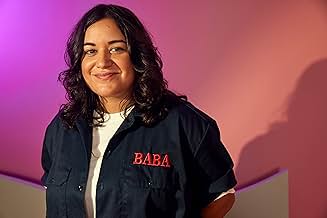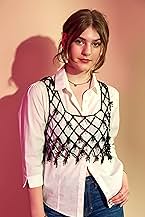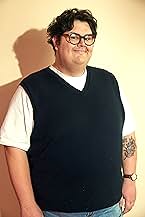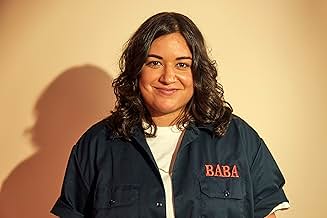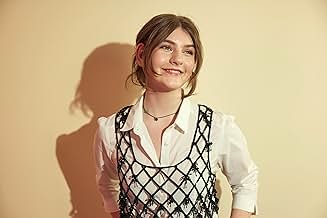VALUTAZIONE IMDb
6,4/10
4126
LA TUA VALUTAZIONE
Sam, una cabarettista alle prese con il disturbo da stress post-traumatico, valuta se partecipare o meno alla ricerca di un'adolescente scomparsa a cui faceva la babysitter.Sam, una cabarettista alle prese con il disturbo da stress post-traumatico, valuta se partecipare o meno alla ricerca di un'adolescente scomparsa a cui faceva la babysitter.Sam, una cabarettista alle prese con il disturbo da stress post-traumatico, valuta se partecipare o meno alla ricerca di un'adolescente scomparsa a cui faceva la babysitter.
- Regia
- Sceneggiatura
- Star
- Premi
- 8 candidature totali
Recensioni in evidenza
I think the movie 'Funny People' gave me PTSD for movies about comedians. I didn't enjoy that movie much at all and I think I was worried I was going to have a similar experience with 'I Used to be Funny'. That couldn't have been further from the case though. I was glued to the screen for every minute of this film.
Rachel Sennott has been one of the most interesting actresses to watch in recent years, but this film gave her the chance to prove she can truly act in a dramatic role. And she killed it. Also I had never heard of Caleb Hearon until this week and yet now I've seen him steal the show in two films. He has a lot of charm that man.
This is a heavy film. It's gritty and raw and quite devastating at times. I loved the structure of the film, with the intersecting timelines and the mystery around what exactly happened. I will say you have to have your wits about you at times to keep on track of which timeline you are actually in.
I really enjoyed this film. I'm quite surprised to be honest to see it with only a 6.3/10 on IMDb. I feel like I must've seen something in it that others didn't. I highly recommend this one though. 9/10.
Rachel Sennott has been one of the most interesting actresses to watch in recent years, but this film gave her the chance to prove she can truly act in a dramatic role. And she killed it. Also I had never heard of Caleb Hearon until this week and yet now I've seen him steal the show in two films. He has a lot of charm that man.
This is a heavy film. It's gritty and raw and quite devastating at times. I loved the structure of the film, with the intersecting timelines and the mystery around what exactly happened. I will say you have to have your wits about you at times to keep on track of which timeline you are actually in.
I really enjoyed this film. I'm quite surprised to be honest to see it with only a 6.3/10 on IMDb. I feel like I must've seen something in it that others didn't. I highly recommend this one though. 9/10.
"I Used to Be Funny" is a captivating Canadian film that masterfully weaves together raw, heartbreaking moments with a surprising touch of humor. Rachel Sennott's performance shines yet again, reaffirming my unwavering admiration for her talent. As both the lead and a true force on screen, Sennott's portrayal effortlessly captures the complexities of the character's journey.
Ally Pankiw's directorial debut is stellar, showcasing a deep understanding of the human experience. While not flawless, the film's imperfections only add to its authenticity. Pankiw's skillful storytelling draws viewers into the protagonist's world, offering an accurate depiction of life with PTSD. The film's ability to blend these elements in a way that's both poignant and relatable makes it a must-see for anyone seeking a moving cinematic experience.
Ally Pankiw's directorial debut is stellar, showcasing a deep understanding of the human experience. While not flawless, the film's imperfections only add to its authenticity. Pankiw's skillful storytelling draws viewers into the protagonist's world, offering an accurate depiction of life with PTSD. The film's ability to blend these elements in a way that's both poignant and relatable makes it a must-see for anyone seeking a moving cinematic experience.
I found the description of this movie to be deceptive. The story is about a former comedian where something happened that derailed her life.
The description says PSTD but what this trauma event is it not immediately revealed. The movie spends the three quarters of the time dancing around something having happened.
The dialog tries to be hip about teenage topics but it is mostly just cringe. No cap.
Much of the story is told as flash backs interweaved into the present so such it's never really clear when anything is occurring until several beats into a scene. I found this all irritating and bad story telling.
The movie eludes to what may have happened and while it's possible to guess, it's makes it all the worse that they don't just say it.
Everyone in the movie knows what happened but we are left out of being shared the details. Conversations about the event happen over and over to the point of becoming fraying, like an inside joke that no one will explain to you until you start to wonder if the pay off will be worth it.
It won't.
This fake tension is bad story telling. There is a missing child and the description creates a narrative that this is a big part of the movie but it's simply not. Our main character spends most of the movie unconcerned about the child's whereabouts. Its only purpose is to provide an ending to an otherwise meandering mess of a movie.
The description says PSTD but what this trauma event is it not immediately revealed. The movie spends the three quarters of the time dancing around something having happened.
The dialog tries to be hip about teenage topics but it is mostly just cringe. No cap.
Much of the story is told as flash backs interweaved into the present so such it's never really clear when anything is occurring until several beats into a scene. I found this all irritating and bad story telling.
The movie eludes to what may have happened and while it's possible to guess, it's makes it all the worse that they don't just say it.
Everyone in the movie knows what happened but we are left out of being shared the details. Conversations about the event happen over and over to the point of becoming fraying, like an inside joke that no one will explain to you until you start to wonder if the pay off will be worth it.
It won't.
This fake tension is bad story telling. There is a missing child and the description creates a narrative that this is a big part of the movie but it's simply not. Our main character spends most of the movie unconcerned about the child's whereabouts. Its only purpose is to provide an ending to an otherwise meandering mess of a movie.
Powerful message and subject in this movie but the journey its a little tiresome, there is no real history here, its a basic movie, the protagonist is amazing but the rest of the cast are not very good in this, they are rookies I guess, they are not the best actors in here tbh, the way the story is told is kinda of make no sense just like this review, it's convoluted and not easy to follow but maybe im slow i don't know, the protagonist is a very funny stand up comedy artist and she is fighting some demons in this movie, and that's a very interesting thing to follow but the way its told through flashbacks it wasn't really neccesary, its hard to understand ok guys.
Ally Pankiw's feature debut "I Used to be Funny" competently explores fragile experiences of depression and PSTD, recovering from assault, and child endangerment with a tame dose of fragile drama, sprinkled with witty humour.
Pankiw's choice to present the story through sequencing between Sam's mission to find a missing Brooke, the young girl she nannied, and frequent flashbacks of memories of the two's once-close bond. While the concept of a non-linear narrative is meant to efficiently expand the dynamics and pasts of the characters and their journeys, which it technically achieves for the majority of the film. The beginning of this sequence felt static as the vague nature that shrouded the connection between Sam, her trauma, and her past with Brooke, overstayed its welcome in the first third of the story. However, the pace thankfully accelerates once the first clues of Brooke's disappearance are uncovered.
Some elements of the film at times, lean too hard into melodrama that lacks actual substance, especially in the vague and unmoving first third of the film. Cuts to some flashbacks that felt somewhat cliche a script that at times felt too expository, and perhaps two-too-many Phoebe Bridgers needle drops; tools that ask the audience to engage with the characters and the mysterious tragedy that haunts them. These elements may have been appropriate in the context of a television episode, considering Pankiw's background in TV direction, but unfortunately fell flat within a full-length feature film.
Amidst these faults, one of the film's greatest strengths is its talented cast. Rachel Sennott's has not only cemented herself as a star of off-beat and relatable comedy but also demonstrated a striking capacity for performances filled with intense vulnerability, harmoniously embodying all relevant elements of the tragicomedy genre. Her ability to foster chemistry with the rest of the cast only adds further dimension to the sorrow and humor that defines her character's journey.
Overall, I Used to Be Funny poses an intimate image of how trauma can take control of our lives and sense of self-worth. While bleak, the potential for healing is also presented as the empathetic and hopeful conclusion to Sam and Brooke's journey. While the film's approach at times lacks the ingenuity and impact it clearly intended to bring, it remains that Pankiw's strength lies in how she stays firm with the difficult themes and issues she addresses.
Pankiw's choice to present the story through sequencing between Sam's mission to find a missing Brooke, the young girl she nannied, and frequent flashbacks of memories of the two's once-close bond. While the concept of a non-linear narrative is meant to efficiently expand the dynamics and pasts of the characters and their journeys, which it technically achieves for the majority of the film. The beginning of this sequence felt static as the vague nature that shrouded the connection between Sam, her trauma, and her past with Brooke, overstayed its welcome in the first third of the story. However, the pace thankfully accelerates once the first clues of Brooke's disappearance are uncovered.
Some elements of the film at times, lean too hard into melodrama that lacks actual substance, especially in the vague and unmoving first third of the film. Cuts to some flashbacks that felt somewhat cliche a script that at times felt too expository, and perhaps two-too-many Phoebe Bridgers needle drops; tools that ask the audience to engage with the characters and the mysterious tragedy that haunts them. These elements may have been appropriate in the context of a television episode, considering Pankiw's background in TV direction, but unfortunately fell flat within a full-length feature film.
Amidst these faults, one of the film's greatest strengths is its talented cast. Rachel Sennott's has not only cemented herself as a star of off-beat and relatable comedy but also demonstrated a striking capacity for performances filled with intense vulnerability, harmoniously embodying all relevant elements of the tragicomedy genre. Her ability to foster chemistry with the rest of the cast only adds further dimension to the sorrow and humor that defines her character's journey.
Overall, I Used to Be Funny poses an intimate image of how trauma can take control of our lives and sense of self-worth. While bleak, the potential for healing is also presented as the empathetic and hopeful conclusion to Sam and Brooke's journey. While the film's approach at times lacks the ingenuity and impact it clearly intended to bring, it remains that Pankiw's strength lies in how she stays firm with the difficult themes and issues she addresses.
Lo sapevi?
- QuizDirector Ally Pankiw was dating Muna member Naomi McPherson during the production of the film, but have since broken up. Naomi is still second to the top of special thanks during credits, and two Muna songs feature during the film.
I più visti
Accedi per valutare e creare un elenco di titoli salvati per ottenere consigli personalizzati
- How long is I Used to Be Funny?Powered by Alexa
Dettagli
- Data di uscita
- Paesi di origine
- Lingua
- Celebre anche come
- Колись я була смішною
- Aziende produttrici
- Vedi altri crediti dell’azienda su IMDbPro
Botteghino
- Lordo Stati Uniti e Canada
- 171.756 USD
- Fine settimana di apertura Stati Uniti e Canada
- 29.499 USD
- 9 giu 2024
- Lordo in tutto il mondo
- 171.756 USD
- Tempo di esecuzione1 ora 45 minuti
- Colore
- Proporzioni
- 2.00 : 1
Contribuisci a questa pagina
Suggerisci una modifica o aggiungi i contenuti mancanti

Divario superiore
What is the Canadian French language plot outline for I Used to Be Funny (2023)?
Rispondi



